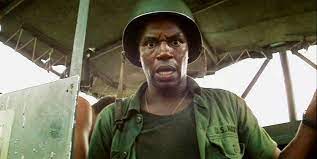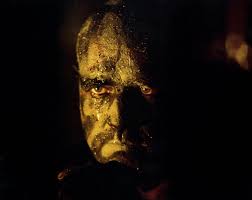"This is the end, beautiful friend. This is the end, my only friend - the end" - The End, The Doors
Francis Ford Coppola's epic 1979 film Apocalypse Now (shown recently on BBC1 and still available on iPlayer) is the film that, infamously, starts with the end. Not just The Doors song The End but what looks something like the end of all reason and sanity.
"Saigon. Shit, I'm still only in Saigon" - Willard
If not an end to hostility. Captain Benjamin Willard (Martin Sheen) wakes up in a Saigon hotel room, surrounded by booze, war paraphernalia, and, most of all, memories. Memories he can't escape. He pours more liquor down his throat, punches a mirror, and writhes around drunkenly on his blood stained bed sheets in his pants. Quite remarkably, Captain Benjamin Willard is one of the more sober characters in Apocalypse Now.
He is summoned to Nha Trang and ordered, by Lieutenant General R. Corman (G. D. Spradlin) and Colonel G. Lucas (Harrison Ford) - as well as the mysterious Jerry (Jerry Ziesmer), to "terminate with extreme prejudice" the command of Colonel Walter Kurtz (Marlon Brando).
Kurtz appears to have gone rogue, very likely insane. He's crossed the border from Vietnam into Cambodia with a Montagnard army he's assembled who worship him as a God. His methods, if they can be called that, seem to have gone too far. For the US military. During the Vietnam War. Willard is told his mission "does not exist" and "nor will it ever exist"
"I was going to the worst place in the world - and I didn't even know it yet" - Willard
Still, he accepts it. With some trepidation. Willard had killed before. Plenty of times. But never an American. Never an officer. He boards a boat captained by the officious Chief Petty Office George Phillips (Albert Hall). Its crew are boys forced to live a life that would break most men.
Gunner's Mate 3rd Class Tyrone "Mr Clean" Miller (a young Laurence Fishburne) is a cocksure seventeen year old New Yorker prone to singing and dancing along to The Rolling Stones and The Beach Boys' Surfin' Safari, Gunner's Mate 3rd Class Lance B. Johnson (Sam Bottoms) is a California surf dude fond of hallucinogenic drugs, and Engineman 3rd Class Jay 'Chef' Hicks (Frederic Forrest) - a New Orleans sauce chef who reads Henry Miller's Sexus and would rather be anywhere in the world than in the Vietnamese jungle fighting a war.
That's understandable. Other than mangoes, very little comes out of the jungle. There are tigers, there is the threat of malaria, there are the Viet-Cong, and, in this world, there are US soldiers who have gone completely loco. If there is one small criticism of Apocalypse Now it is that there is not one Vietnamese character who is fleshed out, ascribed motivation, or even given more than a single cursory line to speak.
If the film was made now, I suspect it would be a different matter. But Coppola's intention is to tell a story not specific to Vietnam, but universal in its reach. Adapted from Joseph Conrad's 1899 novella Heart of Darkness about a European sailor on the Congo river in Africa during colonial rule, Apocalypse Now explores themes of alienation, power, morality, and what war does to men.
We see beautiful landscapes (shot, I believe, in the Philippines) but we see those beautiful landscapes scarred by man's hostility to his fellow man. We see forests of palm trees burning down, we see entire villages torched, we hear the sound of helicopter rotor blades, and we see those helicopters (one emblazoned with the legend - DEATH FROM ABOVE - in a film set in 1979!) fly low over Vietnamese men, women, and children as desensitised teenage American soldiers fire bullets into them.
The constant shots of Budweiser (product placement or is Coppola making a point about American values here?) and surf talk sit uneasily with this industrial scale murder. Not least when Willard and the men he is travelling up river with encounter the deranged, violent, and surf obsessed Lieutenant Colonel Kilgore (Robert Duvall). A man who, after napalming a village, calls the Vietnamese "fucking savages" for having the temerity of retaliate.
"I love the smell of napalm in the morning" - Kilgore
Kilgore is desperate to surf in the blood stained waves of the South China Sea and the fact that "Charlie don't surf" means he can excuse flying over entire villages of Vietnamese (Charlie is far from the worst racist slur they endure, elsewhere we hear the Vietnamese referred to as "gooks" and, Jeremy Clarkson's old favourite "slopes"), blasting out Wagner's Ride of the Valkyries, while summarily executing each and every person he sees.
If a man as clearly deranged as Kilgore is allowed to stay in position, Willard starts to wonder in a voice over provided by war correspondent Michael Herr, then just how bad is Kurtz? Can he really be worse than Kilgore or is there another agenda? Is Kurtz insane or is war itself a form of insanity? Are the insane ones the only ones who can survive, thrive even, in such inhumane circumstances?
Kurtz thinks, and we see Willard begin to understand his logic, that the US are fighting the war as tourists. They're drinking, dancing, surfing, smoking dope, dropping acid, and lusting over Playboy Playmates who have been helicoptered in to keep morale high while the Viet-Cong are left to lead far simpler lives with a far simpler motivation to fight.
Because if they don't they will lose - and they will die. It's quite an ask to suggest that the US military should have fought the Vietnam War, one that resulted in somewhere between one and four million human deaths, with even more lethal force than they did but the fact that this question is even asked shows what war does to a man's soul.
Willard certainly starts acting as if he's bought into that line, Kurtz' line, of thinking and as his boat journeys further into the interior of the South East Asian jungle we also journey deeper into the interior of Willard's, and - by extension - man's, soul. It gets darker, it gets weirder, and it gets strangely beautiful. Coppola has filmed scenes of massacres and bloodshed in an almost balletic fashion and when Willard finally reaches Kurtz's HQ in an abandoned Angkor temple it is more reminiscent of Skull Island in the 1933 version of King Kong than any normal military facility.
There's an element of Jonestown to it as well, and a feel we have reached Dante's Seventh Circle of Hell. The endgame, it will come as no surprise, does not look promising. Willard is primed for an existential debate with Kurtz following an overnight stay at a colonial era plantation owned by Hubert Desmarais (Christian Marquand) in which wine and accordion music soundtrack a philosophical debate about the rights and wrongs of colonialism, Communism, war, and life itself.
Willard is even treated to a rare night of passion with the young widow Roxanne Sarrault (Aurore Clement). The debate is heated and, unseen, we must assume the sex to have been too but it's only a primer for Willard's eventual, long awaited, meeting with Kurtz.
"Are you an assassin" - Kurtz
"I'm a solider" - Willard
"You're neither. You're an errand boy. Sent by grocery clerks. To collect a bill" - Kurtz
Brando is, of course, captivating as Kurtz. He uses his charisma, his reputation, and his acting smarts to completely own the scenes he's in. He even demanded, apparently, that Dennis Hopper (who plays a photojournalist in thrall to Kurtz) was not allowed on set at the same time as him (it's a rare film in which Hopper only plays the fourth most bonkers character).
But not even Brando can entirely dominate Apocalypse Now. It's an ensemble piece in which each and every character, no matter how big or small, punches above their weight. It's a dark, often uncomfortable, ride into man's complex nature and how war allows us to indulge our most transgressive desires but, at its heart, it remains a sense of humanity.
When a leading character dies for the first time it is handled with grace and panache but it is rendered shocking, pointless, and a tragic waste of life. Many of those waging war in Vietnam had no idea what they were fighting for yet died senseless deaths fighting for it all the same. War doesn't make sense. Why should those fighting it expect it to?













No comments:
Post a Comment